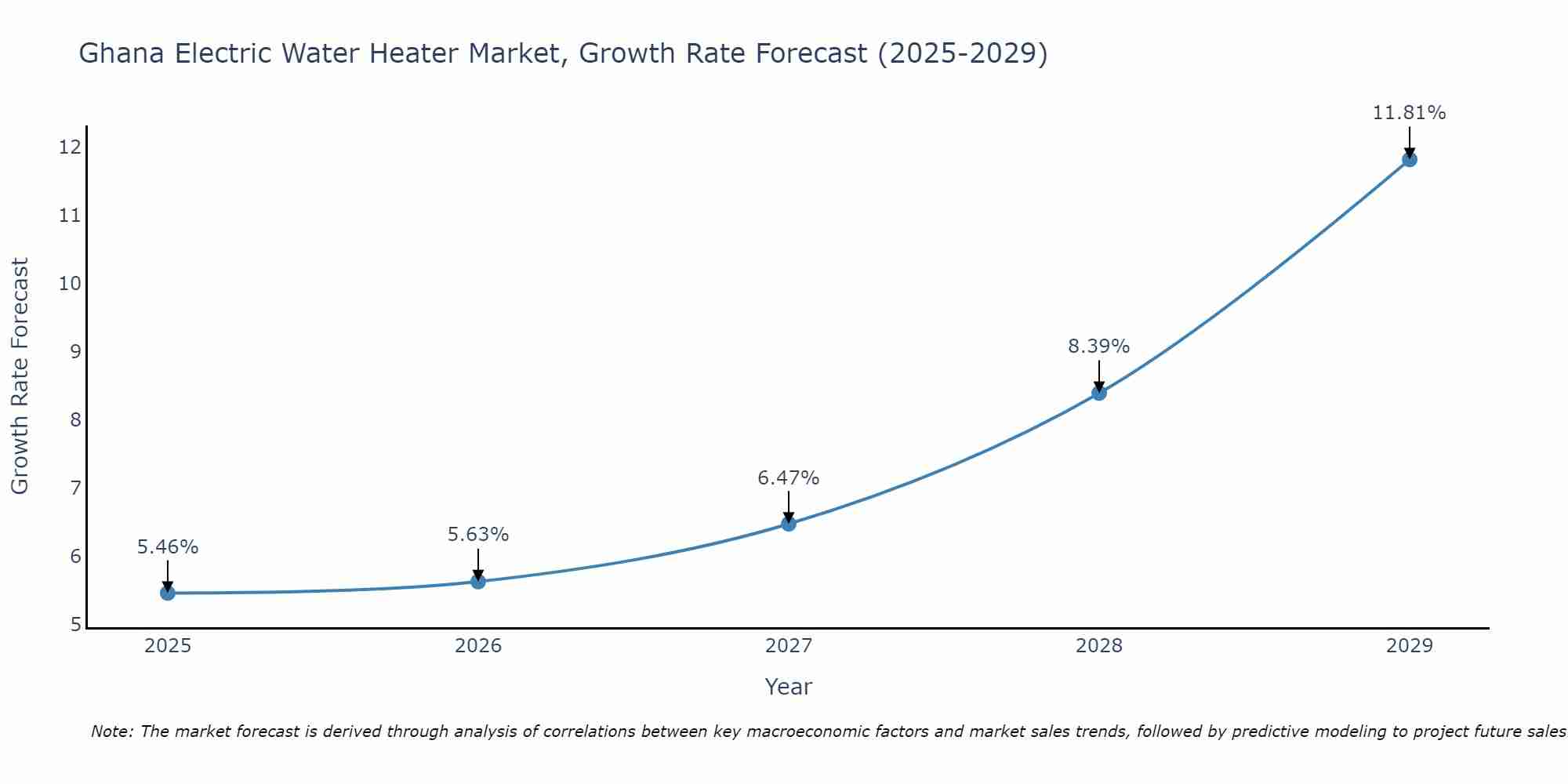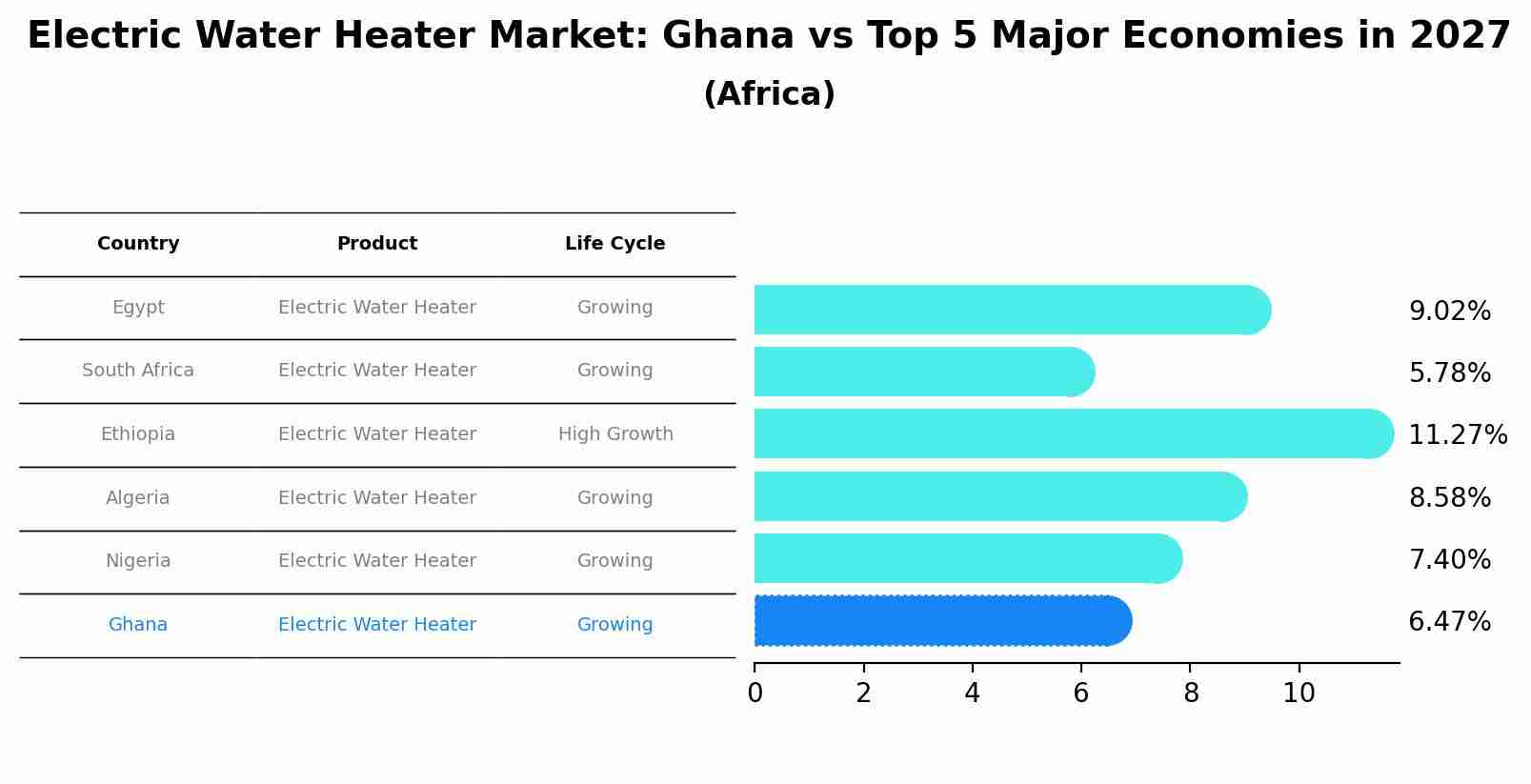Ghana Electric Water Heater Market (2026-2032) | Size, Industry, Companies, Trends, Revenue, Growth, Share, Analysis, Value & Forecast
Market Forecast By Product (Storage Water Heaters (Up to 30 Litres, 30.1 to 100 Litres, 100.1 to 250 Litres, 250.1 to 400 Litres, Above 400 Litres), Non-Storage Water Heaters), By Applications (Residential, Commercial, Industrial) and competitive landscape
| Product Code: ETC261716 | Publication Date: Aug 2022 | Updated Date: Dec 2025 | Product Type: Market Research Report | |
| Publisher: 6Wresearch | Author: Ravi Bhandari | No. of Pages: 70 | No. of Figures: 35 | No. of Tables: 5 |
Ghana Electric Water Heater Market Size Growth Rate
The Ghana Electric Water Heater Market is likely to experience consistent growth rate gains over the period 2025 to 2029. From 5.46% in 2025, the growth rate steadily ascends to 11.81% in 2029.

Electric Water Heater Market: Ghana vs Top 5 Major Economies in 2027 (Africa)
The Electric Water Heater market in Ghana is projected to grow at a growing growth rate of 6.47% by 2027, highlighting the country's increasing focus on advanced technologies within the Africa region, where Egypt holds the dominant position, followed closely by South Africa, Ethiopia, Algeria and Nigeria, shaping overall regional demand.

Ghana Electric Water Heater Market Highlights
| Report Name | Ghana Electric Water Heater Market |
| Forecast period | 2026-2032 |
| CAGR | 6% |
| Growing Sector | Residential |
Ghana Electric Water Heater Market Synopsis
Ghana electric water heater market is anticipated to garner potential growth revenues in the foreseeable future on the back of the increased building strategies and eco-standard regulations by the government and concerned electricity authorities in the country which are instigating the adoption of energy-efficient electrical appliances. A spur in the technical competition along with an increase in the product innovation and deployment of advanced features which tend to improve the efficiency of the product is expected to trigger the demand for electric water heaters in Ghana in the coming timeframe and complement the market landscape of Ghana electric water heater market in the upcoming six years.
According to 6Wresearch internal database and industry insights, the Ghana Electric Water Heater Market is expected to grow at a CAGR of 6% during the forecast period (2026-2032). The rising disruption in national activities has disturbed the overall production of electric water heaters, backed by the nationwide restrictions imposed to contain the situation, which has led to a significant disturbance in the sales of electric water heaters in the country and has contributed towards the slow growth of the market. However, increased residential use of water coupled with a heightened need for bathing and hygienic activities has led to an increased demand for hot water, which in turn instigated prospective demand for electric water heaters and simultaneously benefited the growth of the Ghana electric water heater market.
Drivers of the market
The demand for energy-efficient and instant hot water solutions for residential, commercial, and industrial applications in Ghana is driving the growth of the electric water heater market. Electric water heaters offer rapid heating, precise temperature control, and compact designs, driving convenience, comfort, and energy savings for users.
Challenges of the market
Challenges in the electrolytic capacitor market in Ghana include quality control and reliability issues affecting capacitor performance and longevity in electronic circuits. Moreover, addressing technological advancements and miniaturization trends may pose challenges for electrolytic capacitor manufacturers in meeting customer demands for compact and high-performance capacitor solutions.
Government Policy of the market
To encourage the transition towards energy-efficient and environmentally friendly water heating solutions, the government of Ghana has implemented policies to promote the adoption of electric water heaters. These policies include energy efficiency standards and labeling requirements for water heater products, consumer education campaigns on the benefits of electric water heating, and financial incentives such as rebates or tax credits for the purchase of energy-efficient water heater models.
Key Attractiveness of the Report
- 10 Years of Market Numbers.
- Historical Data Starting from 2022 to 2025.
- Base Year: 2025
- Forecast Data until 2032.
- Key Performance Indicators Impacting the market.
- Major Upcoming Developments and Projects.
Key Highlights of the Report:
- Ghana Electric water heater Market Overview
- Ghana Electric Water Heater Market Outlook
- Ghana Electric Water Heater Market Forecast
- Ghana Electric Water Heater Market Size
- Historical Data of Ghana Electric Water Heater Market Revenues and Volume for the period, 2022-2032
- Ghana Electric Water Heater Market Forecast of Revenues and Volume, Until 2032
- Historical Data of Ghana Electric Water Heater Market Revenues and Volume for the period, By Product, 2022-2032
- Forecast of Ghana Electric Water Heater Market Revenues and Volume, By Product, Until 2032
- Historical Data of Ghana Electric Water Heater Market Revenues and Volume for the period, By Capacity, 2022-2032
- Forecast of Ghana Electric Water Heater Market Revenues and Volume, By Capacity, Until 2032
- Historical Data of Ghana Electric Water Heater Market Revenues for the period, By Applications, 2022-2032
- Forecast of Ghana Electric Water Heater Market Revenues, By Applications, Until 2032
- Ghana Electric Water Heater Market Outlook on Drivers and Restraints
- Ghana Electric Water Heater Market Trends
- Ghana Electric Water Heater Industry Life Cycle
- Porter’s Five Force Analysis
- Ghana Electric Water Heater Market Opportunity Assessment
- Ghana Electric Water Heater Market Share, By Company
- Ghana Electric Water Heater Market Overview on Competitive Benchmarking
- Company Profiles
- Key Strategic Recommendations
Markets Covered:
The report provides a detailed analysis of the following market segments.
By Product:
- Storage Water Heaters
- Up to 30 Litres
- 1 to 100 Litres
- 1 to 250 Litres
- 1 to 400 Litres
- Above 400 Litres
- Non-Storage Water Heaters
By Applications:
- Residential
- Commercial
- Industrial
Ghana Electric Water Heater Market (2026-2032): FAQs
| 1 Executive Summary |
| 2 Introduction |
| 2.1 Key Highlights of the Report |
| 2.2 Report Description |
| 2.3 Market Scope & Segmentation |
| 2.4 Research Methodology |
| 2.5 Assumptions |
| 3 Ghana Electric Water Heater Market Overview |
| 3.1 Ghana Country Macro Economic Indicators |
| 3.2 Ghana Electric Water Heater Market Revenues & Volume, 2022 & 2032F |
| 3.3 Ghana Electric Water Heater Market - Industry Life Cycle |
| 3.4 Ghana Electric Water Heater Market - Porter's Five Forces |
| 3.5 Ghana Electric Water Heater Market Revenues & Volume Share, By Product Type, 2022 & 2032F |
| 3.6 Ghana Electric Water Heater Market Revenues & Volume Share, By Application, 2022 & 2032F |
| 4 Ghana Electric Water Heater Market Dynamics |
| 4.1 Impact Analysis |
| 4.2 Market Drivers |
| 4.2.1 Increasing urbanization and population growth in Ghana leading to higher demand for electric water heaters. |
| 4.2.2 Rising disposable income levels in the country contributing to the affordability of electric water heaters. |
| 4.2.3 Government initiatives promoting the adoption of energy-efficient appliances, including electric water heaters. |
| 4.3 Market Restraints |
| 4.3.1 High initial cost of purchasing and installing electric water heaters. |
| 4.3.2 Limited access to reliable electricity in some regions of Ghana affecting the widespread adoption of electric water heaters. |
| 4.3.3 Competition from alternative water heating solutions such as solar water heaters and gas-powered water heaters. |
| 5 Ghana Electric Water Heater Market Trends |
| 6 Ghana Electric Water Heater Market, By Types |
| 6.1 Ghana Electric Water Heater Market, By Product Type |
| 6.1.1 Overview and Analysis |
| 6.1.2 Ghana Electric Water Heater Market Revenues & Volume, By Product Type, 2022-2032F |
| 6.1.3 Ghana Electric Water Heater Market Revenues & Volume, By Tankless Water Heater, 2022-2032F |
| 6.1.4 Ghana Electric Water Heater Market Revenues & Volume, By Storage Water Heater, 2022-2032F |
| 6.2 Ghana Electric Water Heater Market, By Application |
| 6.2.1 Overview and Analysis |
| 6.2.2 Ghana Electric Water Heater Market Revenues & Volume, By Residential, 2022-2032F |
| 6.2.3 Ghana Electric Water Heater Market Revenues & Volume, By Commercial, 2022-2032F |
| 6.2.4 Ghana Electric Water Heater Market Revenues & Volume, By Industrial, 2022-2032F |
| 7 Ghana Electric Water Heater Market Import-Export Trade Statistics |
| 7.1 Ghana Electric Water Heater Market Export to Major Countries |
| 7.2 Ghana Electric Water Heater Market Imports from Major Countries |
| 8 Ghana Electric Water Heater Market Key Performance Indicators |
| 8.1 Average electricity consumption per household in Ghana. |
| 8.2 Percentage of households with access to reliable electricity. |
| 8.3 Government subsidies or incentives for energy-efficient appliances. |
| 8.4 Number of construction permits issued for residential buildings in urban areas. |
| 8.5 Consumer awareness and preferences towards energy-efficient appliances. |
| 9 Ghana Electric Water Heater Market - Opportunity Assessment |
| 9.1 Ghana Electric Water Heater Market Opportunity Assessment, By Product Type, 2022 & 2032F |
| 9.2 Ghana Electric Water Heater Market Opportunity Assessment, By Application, 2022 & 2032F |
| 10 Ghana Electric Water Heater Market - Competitive Landscape |
| 10.1 Ghana Electric Water Heater Market Revenue Share, By Companies, 2025 |
| 10.2 Ghana Electric Water Heater Market Competitive Benchmarking, By Operating and Technical Parameters |
| 11 Company Profiles |
| 12 Recommendations |
| 13 Disclaimer |
- Single User License$ 1,995
- Department License$ 2,400
- Site License$ 3,120
- Global License$ 3,795
Search
Thought Leadership and Analyst Meet
Our Clients
Related Reports
- South Africa Stationery Market (2025-2031) | Share, Size, Industry, Value, Growth, Revenue, Analysis, Trends, Segmentation & Outlook
- Afghanistan Rocking Chairs And Adirondack Chairs Market (2026-2032) | Size & Revenue, Competitive Landscape, Share, Segmentation, Industry, Value, Outlook, Analysis, Trends, Growth, Forecast, Companies
- Afghanistan Apparel Market (2026-2032) | Growth, Outlook, Industry, Segmentation, Forecast, Size, Companies, Trends, Value, Share, Analysis & Revenue
- Canada Oil and Gas Market (2026-2032) | Share, Segmentation, Value, Industry, Trends, Forecast, Analysis, Size & Revenue, Growth, Competitive Landscape, Outlook, Companies
- Germany Breakfast Food Market (2026-2032) | Industry, Share, Growth, Size, Companies, Value, Analysis, Revenue, Trends, Forecast & Outlook
- Australia Briquette Market (2025-2031) | Growth, Size, Revenue, Forecast, Analysis, Trends, Value, Share, Industry & Companies
- Vietnam System Integrator Market (2025-2031) | Size, Companies, Analysis, Industry, Value, Forecast, Growth, Trends, Revenue & Share
- ASEAN and Thailand Brain Health Supplements Market (2025-2031) | Strategy, Consumer Insights, Analysis, Investment Trends, Opportunities, Growth, Size, Share, Industry, Revenue, Segments, Value, Segmentation, Supply, Forecast, Restraints, Outlook, Competition, Drivers, Trends, Demand, Pricing Analysis, Competitive, Strategic Insights, Companies, Challenges
- ASEAN Bearings Market (2025-2031) | Strategy, Consumer Insights, Analysis, Investment Trends, Opportunities, Growth, Size, Share, Industry, Revenue, Segments, Value, Segmentation, Supply, Forecast, Restraints, Outlook, Competition, Drivers, Trends, Demand, Pricing Analysis, Competitive, Strategic Insights, Companies, Challenges
- Europe Flooring Market (2025-2031) | Outlook, Share, Industry, Trends, Forecast, Companies, Revenue, Size, Analysis, Growth & Value
Industry Events and Analyst Meet
Whitepaper
- Middle East & Africa Commercial Security Market Click here to view more.
- Middle East & Africa Fire Safety Systems & Equipment Market Click here to view more.
- GCC Drone Market Click here to view more.
- Middle East Lighting Fixture Market Click here to view more.
- GCC Physical & Perimeter Security Market Click here to view more.
6WResearch In News
- Doha a strategic location for EV manufacturing hub: IPA Qatar
- Demand for luxury TVs surging in the GCC, says Samsung
- Empowering Growth: The Thriving Journey of Bangladesh’s Cable Industry
- Demand for luxury TVs surging in the GCC, says Samsung
- Video call with a traditional healer? Once unthinkable, it’s now common in South Africa
- Intelligent Buildings To Smooth GCC’s Path To Net Zero


















